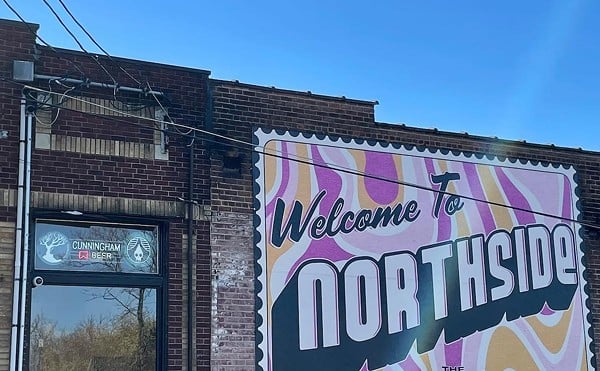|
Michael Shepard knows all too well about second chances. Because he gave music another try, music has extended the same courtesy to him and his Emo/Prog quartet, Lovedrug.
Four years ago, the Canton, Ohio, native found himself at the end of a five-year run with his first band, Kerith Ravine. The group had dissolved when their half-decade together had failed to produce any forward momentum, and the break-up forced Shepard into a period of critical self-examination.
Finally, he decided to give up music altogether, move to New York and pursue a film school education.
"I've always been intrigued by film and interested in getting involved in film, in the writing process and directing," Shepard says from his northern Ohio home. "I feel like that's where my nature lies, in that aspect of pouring things together and making them work, in the creative sense."
During his four-month film program, Shepard continued to write music even though he'd convinced himself that music wasn't his path. When he weighed the two disciplines, he couldn't avoid the obvious conclusion.
"I came to the vast realization that I couldn't escape the music that was inside of me," Shepard says.
"The kind of thing I wanted to create was still very musical."
After making the decision to move back to Canton, Shepard contacted his friend and Kerith Ravine bassist Adam Ladd to see if he'd be interested in starting a new band. Ladd had been thinking along those very lines and readily agreed. Once Shepard was back in town, Lovedrug was born.
"Essentially, the name came from that very idea of not being able to escape something that you're very passionate about," Shepard says, "something that's inside of you that you have a lot of love for. It could be anything. For me, it was music. My love for music was dragging me back into it, whether I wanted to go or not."
Shepard bought an old, beat-up piano from a used music store and holed up in his apartment for a couple of months, feverishly writing the songs that would eventually comprise his new band's first album. With the addition of guitarist Matt Bentley and drummer Joas Miller, Lovedrug was complete. In addition to the revitalization that he felt with the band's fresh beginning, Shepard was equally influenced by his recent film experiences.
"There was a grander sense of working with people," he says, "and learning how to create in an environment where what you're doing needs to appeal to people but still be individual. I tried to apply that to music when I came back. My previous efforts in my other band were truly selfish. I was writing music that was very complicated — several movements within a song, eight-minute epic tales of insanity. It was really enjoyable music for me, but I don't feel like a lot of people would grasp it or appreciate it the way I did."
After recording their debut album, Pretend You're Alive, in 2003, Shepard and his bandmates were fully prepared to self-release the album and do the hard work of touring on their own. Having made a few connections in the industry with Kerith Ravine, Lovedrug's manager decided to send out some tapes just to gauge the interest of a few labels.
They were all surprised by the response the tape generated. After playing the CMJ conference in 2003 and meeting Militia Group honcho Cory Felton, the band signed with the SoCal Punk collective.
The first issue of Pretend You're Alive was in 2004, and the album did extremely well for a baby band, notching sales that made it the fastest-selling debut album in the label's history. Along with the success came a solid couple of years of touring (by the time Pretend You're Alive was released, Miller and Bentley had departed and been replaced by guitarist David Owen and drummer Matthew Putman), opening for the likes of Cat Power, The Killers and Robert Plant — heady stuff for a band from a city with no real music scene to speak of and only regional tours to their credit.
"We were constantly learning things and essentially learning what not to do," Shepard says. "That's how I've always worked. I can't remember a time where I've listened to something and thought, 'That's fantastic, I need to do something just like that.' I've always been the opposite, like, 'Wow, that's horrendous, I have to make sure never to step into that territory.' "
As Lovedrug continued to tour heavily and Pretend You're Alive maintained a steady sales pace, major labels began sniffing around again. With Militia Group's technical status as an autonomous branch of Sony/BMG, Sony reserves the right to upstream any band on the label they feel has greater commercial potential, a right they chose to exercise with Lovedrug.
The company recently re-released Pretend You're Alive on their Columbia/Red Ink imprint in an effort to redistribute the album to stores that might have missed it the first time and to garner radio play it might not have received two years ago.
Shepard is pleased at the renewed opportunities Pretend You're Alive is receiving and sees the label building a career foundation for Lovedrug.
"It's going fabulously," he says. "Everyone at Columbia is really jazzed about the band, and they're treating us well. We've gotten ourselves into this position where they don't treat us like one of those bands where it's like, 'OK, here's the single, let's put a million dollars behind it and, if it works, great, and, if not, forget about it.'
"They view us in a different light, which is nice. It's been hard to get to that point, but it's worth it."
LOVEDRUG perform Monday at Covington's Mad Hatter with Mae and The Audition.





